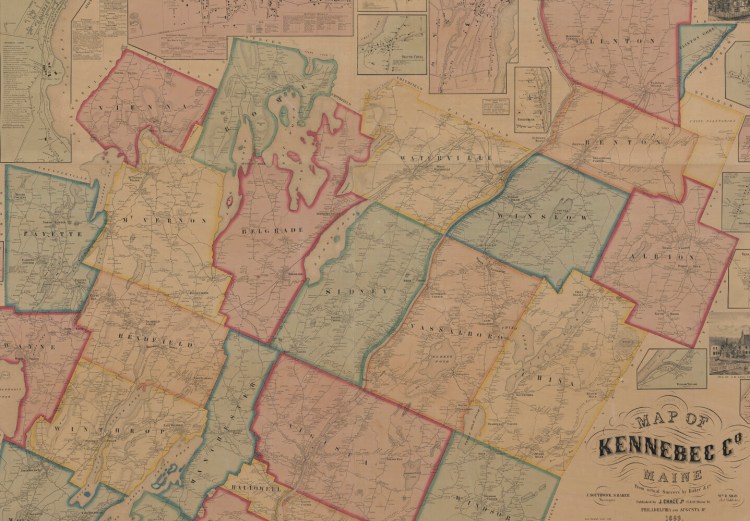Feb. 20, 1797: The Massachusetts legislature votes to partition the Maine town of Hallowell, with the northern part being incorporated as the town of Harrington, named after an English nobleman. Immediate dissatisfaction among residents prompts the selectmen to petition the Boston authorities for a name change.
 The legislature bows to the people’s wishes, and on June 9, the new town is renamed Augusta. The town encompasses two-thirds of the former land of Hallowell and half its population and property valuation.
The legislature bows to the people’s wishes, and on June 9, the new town is renamed Augusta. The town encompasses two-thirds of the former land of Hallowell and half its population and property valuation.
Hallowell long had consisted of two principal settlements – the Hook, where the Kennebec River bends near what is now downtown Hallowell; and the Fort, where Fort Western still stands today across from downtown Augusta. The separation of the two did not sit well with Hook residents.
“The imperialistic method of the fort villagers in procuring the separation, and the haughty ignoring of the wishes of the Hook people as a party deeply interested,” historian Charles E. Nash writes more than a century later, “laid the foundation of a petty enmity between the Fort and Hook which descended to the next generation and survived in the form of unfriendly pranks and sometimes rows between the neighboring youth long after the precise origin of the feud had faded from popular recollection.”
Nash also cites Hook residents’ use of the epithet “Herringtown” to mock the people of Harrington, especially Dr. Daniel Cony, a local benefactor who was in the fish trade. Cony also was in the Massachusetts legislature, however, and was in a good position to make sure the request to rename the town received quick action.
Nash is unable to determine how the name “Augusta” is chosen as a replacement.
Feb. 20, 1799: Two years to the day after the incorporation of Augusta, Maine’s future capital, Kennebec County, of which Augusta becomes the county seat, is set off from Lincoln County. The new county, Maine’s sixth, is the first to have no seacoast, which reflects the growth of the District of Maine’s interior. The interior also is where the movement to separate Maine from Massachusetts is gaining the most traction. Maine’s population is growing rapidly at this time. The number of incorporated towns increases from 71 in 1790 to 126 in 1800.
Feb. 20, 1893: Amid a raging blizzard, Henry A. Wing, of Lewiston, produces the first edition of the Lewiston Daily Sun at a plant on Ash Street in Lewiston. The paper later becomes today’s Sun Journal in a merger with the Lewiston Evening Journal.
Joseph Owen is a retired copy desk chief of the Morning Sentinel and Kennebec Journal and board member of the Kennebec Historical Society. He can be contacted at: jowen@mainetoday.com.
Send questions/comments to the editors.


